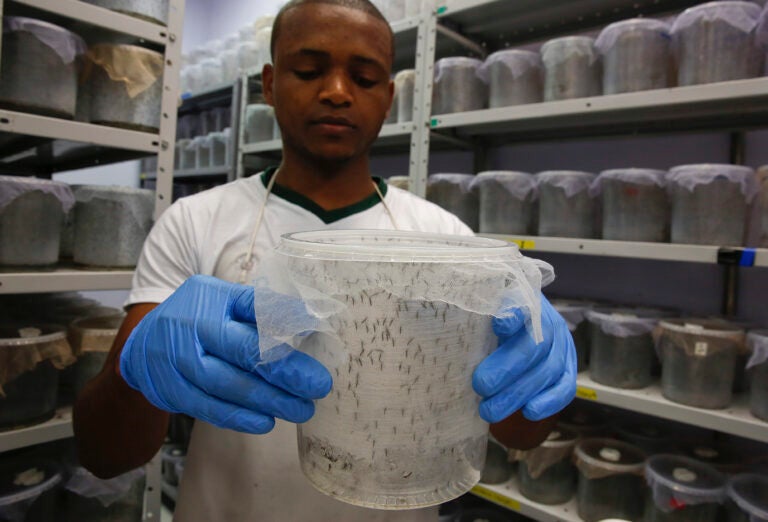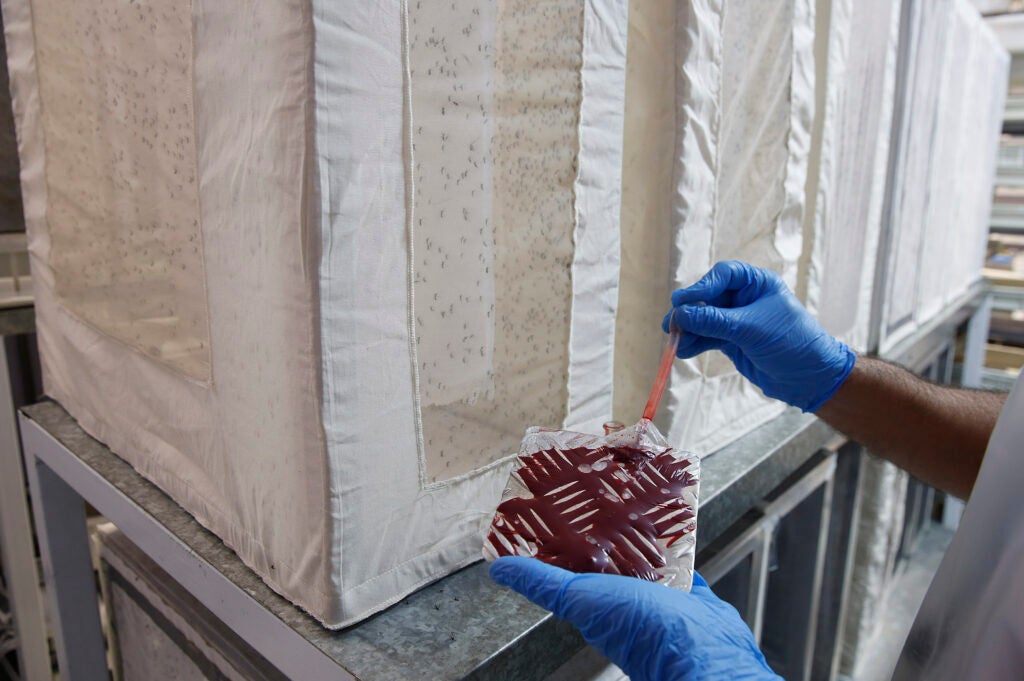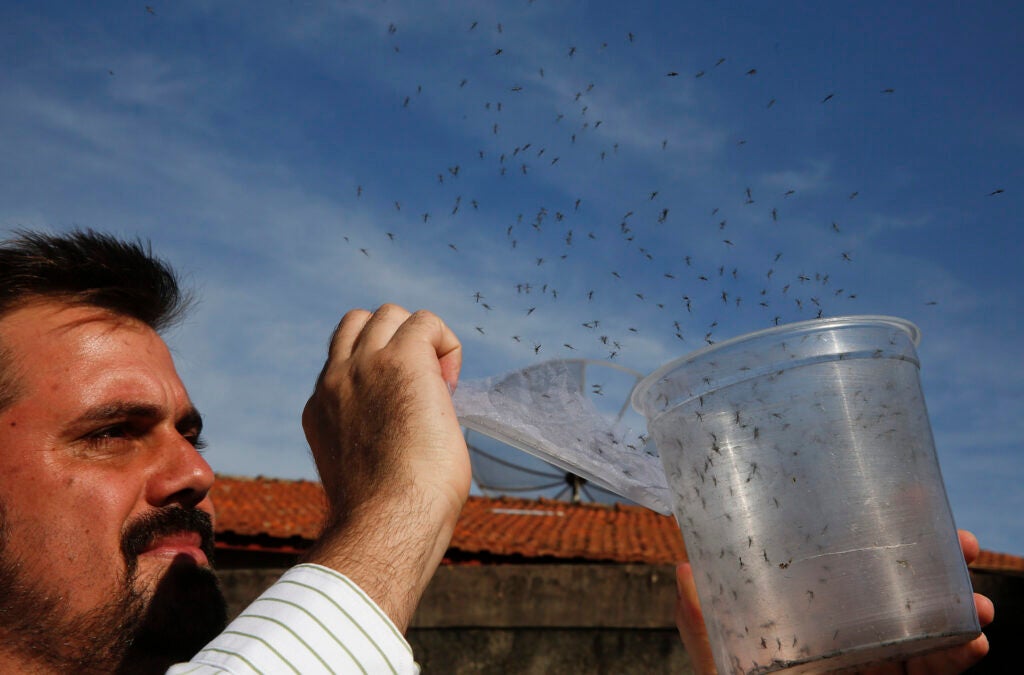Will genetic modification help control mosquitoes — or just create different ones?
The EPA has approved testing the new insects in the Florida Keys, stinging some who fought the trial for years.
Listen 13:37
After years of debate, British biotech company Oxitec has received federal approval to test its genetically modified mosquitoes — which are designed to reduce the local Aedes aegypti population — in the Florida Keys. (AP Photo/Andre Penner)
This story is from The Pulse, a weekly health and science podcast.
Subscribe on Apple Podcasts, Stitcher or wherever you get your podcasts.
“I think you were an omen!”
That’s what Barry Wray, an environmental activist interviewed a few weeks earlier, wrote in an email following the big news.
Omens, of course, are never good, and neither was the news — at least not for Wray.
After years in limbo, the Environmental Protection Agency was granting approval to the testing of genetically engineered mosquitoes in Houston and the Florida Keys, where Wray lives.
“It is unfortunate and disappointing that they chose to shirk their responsibilities,” Wray said. “The EPA has simply rubber-stamped a technology, versus performing their mission to protect humans and ecosystems.”
But for Oxitec, the British biotech company that developed them, the decision was proof their mosquitoes could really do some good.
“I think it’s a vindication,” said Nathan Rose, Oxitec’s head of regulatory affairs. “We think it’s going to bring a really important new tool to the parts of the country that will need it most in the future.”
The decision could mark the end of a nearly decade-long battle over the mosquitoes — which proponents say could save lives, and opponents worry could cause unknown disaster. Over the years, the conflict has divided the Florida Keys, stymied Oxitec’s efforts to enter the American market, and helped drive a minor scientific scandal that recently captured international headlines.
But it’s also been instructive — about the politics of science; the messy, social side of progress; and just how much damage a little mosquito can really do.
Mosquitoes in the Florida Keys
Mosquitoes have always been a problem in the Keys, a string of islands that curves down from the tip of Florida southwest toward Cuba.
“There is a well-known saying here in Florida — if it weren’t for air conditioning and mosquito control, Florida would still be basically uninhabitable,” said Phil Goodman, a commissioner with the Florida Keys Mosquito Control District.

That’s especially true in the Keys, which are home to a number of swamps and nature preserves where mosquitoes are able to thrive undisturbed. That, combined with the fact that they’re surrounded by water and have a tropical climate, have long made the Keys an ideal breeding ground for mosquitoes.
“There’s a lot of stories from back in the ’50s, ’60s and ’70s — if you were driving in the Florida Keys at night and you had a flat tire, you just stayed in your car,” Goodman said, “because it was impossible to change your tire outside without the mosquitoes eating you alive.”
That started to change over the last few decades, thanks in large part to the Florida Keys Mosquito Control District, a tax-funded agency that’s regarded as one of the top mosquito-control outfits in the country.
The operation is managed by five elected commissioners — including Goodman, who got interested about 10 years ago, after retiring from his job in the chemical industry. Goodman figured the Mosquito Control District would be a chance to flex his science background for the good of the community.
“The Florida Keys, we are really the potential hot spot for these mosquito-borne viruses,” he said.
In fact, just two years before Goodman was elected, the Keys had seen an outbreak of dengue fever for the first time in decades.
In the wake of the outbreak, the Mosquito Control District launched an aggressive campaign against Aedes aegypti, the mosquitoes that spread dengue along with other dangerous diseases, such as yellow fever, Zika, and Chikungunya.
But in the process, the team made a disturbing realization: The local Aedes aegypti had developed resistance to their insecticides.
“It’s becoming more and more resistant,” Goodman said. “So in order to control this virus, you know, we can’t spray our way out of this. We’ve got to look for new technologies.”
Enter Oxitec
The Mosquito Control District found a potential solution in Oxitec, a British biotech firm that had set its sights on reducing, or even eliminating, Aedes aegypti.
“What the scientists wanted to do was to use advances in genetics and biotechnology to find a way to target these mosquitoes in a way that was really safe and effective that didn’t require the use of chemical insecticides,” said Nathan Rose, Oxitec’s head of regulatory affairs.

Oxitec did that by developing mosquitoes with what’s called a self-limiting gene — basically, a self-destruct button with a genetic on-off switch. If they receive an antidote while they’re still larvae — an antibiotic called tetracycline — the switch is flipped off and they survive; if not, the switch remains on, and they’re programmed to die.
The idea was to breed male mosquitoes in the lab with the self-limiting gene (male, because only female mosquitoes bite humans), then dose them with the antidote and send them out into the world.
“And when we release those out into the wild, they go out and they do what male mosquitoes do really well, which is find wild female mosquitoes and they mate with them,” Rose said. “And then more than 95% of their offspring will die, because in the wild they don’t have access to this antidote.”
Oxitec tested the mosquitoes in trials that started around 2010 in the Cayman Islands and Brazil. The results were encouraging: According to Rose, they resulted in a 95% decrease in the population of wild mosquitoes.
The data gathered from those first few trials helped lead to second-generation mosquitoes that operate on the same premise — except that instead of killing all mosquitoes, the self-limiting gene would only be activated in females. Males would still be carriers, but their own self-destruct button was gone.
Rose said that makes them easier to breed, and also means that every mosquito is providing more bang for the buck.
“Only the female offspring will die,” he said. “The male offspring will survive, and they’ll be able to carry on passing on this gene to another generation and another generation after that.”
Backlash follows
To Goodman and his colleagues, this sounded like an ideal solution to their dengue problem.
Oxitec, meanwhile, was eager to show that its mosquitoes worked in the United States — it would need to hold a successful trial before federal regulators allowed the company to launch its product in the U.S. market.
So in 2012, Oxitec and the Florida Keys Mosquito Control District started holding community meetings to introduce the idea to locals.
“We had really open minds going into the whole first meeting,” said Wray, the environmental activist who lives in the Keys. “We were actually excited.”
But Wray said excitement quickly turned to suspicion as Oxitec started answering questions.
“The answers out of Oxitec were never really spot on,” Wray said. “People started scratching their heads with all these answers that were kind of unclear and not really succinct. And when people left that meeting, they were more concerned than when they walked in.”
Over the next couple years, community pushback grew. Environmental groups got involved. A petition was launched.
Wray said it all could have been resolved if Oxitec had just answered their questions. For its part, Oxitec said it devoted substantial time to communicating with the locals.
But as the debate grew, the two sides moved farther apart — and the rhetoric amped up, with protesters decrying the trial as potentially dangerous, the Mosquito Control District as fascists, and Oxitec as deceptive and corrupt.
“A lot of it was fake news,” said the mosquito district’s Goodman. “They put out a lot of false information to the community, really scare tactics. And this slowed us down.”
In the meantime, Oxitec was still wading through red tape, trying to get regulatory approval for the trial. Over time, the debate settled to a dull roar.
Subscribe to The Pulse
A scientific scandal
Then, in September of last year, a new study dropped a minor bombshell on the whole argument.
It was called “Transgenic Aedes aegypti Mosquitoes Transfer Genes into a Natural Population,” and it was spearheaded by Jeffrey Powell, a professor of ecology and epidemiology at Yale University, who’d been hearing about Oxitec for years on the conference circuit.
“I would ask them after their talk, I said, ‘Did you ever consider whether releasing all these transgenic males would affect the genetics of the natural populations?’” Powell said. “And usually they would say, ‘No, we haven’t thought about that,’ and that would be it.”
Powell got a chance to answer his own question a few years ago, when he discovered that Oxitec was conducting one of its trials in Brazil, where Powell was doing his own research.
So Powell joined forces with some local scientists to analyze how Oxitec’s lab-created mosquitoes were affecting the genetics of the native mosquito population. He took samples over a period of roughly two years, and released his findings in the 2019 study.

“They’re passing on genes because not 100% of their offspring are dying,” he said. “Enough make it through and are mating and getting incorporated into the population. We don’t know what the consequences is from a practical standpoint.”
What Powell didn’t find was any evidence that it mattered, but that didn’t stop him from speculating in the paper.
“It’s possible they’re bringing genes that could affect insecticide resistance that didn’t exist there before,” Powell said. “It could be bringing genes that enhance their ability to transmit some viruses. We just don’t know, to tell you the truth.”
The study got a lot of media coverage, spawning headlines like, “Plan to kill off mosquitoes backfires, spawning mutant hybrid insects” and “Scientists accidentally create new mutant super mosquito in wild.” That, in turn, fueled further dissent against the potential trial in the Keys.
But privately, a number of researchers were questioning Powell’s findings.
“I was kind of surprised at the claims that were made — I thought that they were pretty irresponsible,” said Brian Lovett, an insect pathologist and mosquito expert who has no connection to Powell or Oxitec. “I was surprised that it had made it through peer review without those claims being questioned. And my view was on the whole shared by the community.”
Lovett said that the study seems to have been designed to provide the minimal amount of data to create flashy claims, and to ask what seemed like controversial questions.
“But when you zoom out,” Lovett said, “what they found is not unexpected.”
Namely, the study found that the Oxitec trial had indeed reduced the local mosquito population, and that there was evidence that a small number of hybrid offspring were surviving — which Oxitec said it has long admitted.
As for Powell’s other suppositions — that the hybrids were somehow fitter, more able to transmit diseases, and more resistant to insecticides —critics argued those were basically flights of fancy, with no data to back them up.
Oxitec ended up writing a complaint to the journal that published the study. Even some of the study’s co-authors voiced criticisms of the paper, saying they’d never gotten a chance to review the final draft and didn’t believe that all the ideas were properly supported.
Powell acknowledged that not providing the final draft to his co-authors was an oversight, and said he’d thought the journal would communicate with them. But he argued that the pushback from his co-authors was largely the result of political pressure from the Brazilian media.
“I’m not against genetically modified organisms,” Powell said. “Tell you the truth, I think using some kind of genetic technique to control mosquito populations is a good idea. I think genetically modifying mosquitoes in a way that they’re less able to transmit diseases is a good idea. But I think sometimes we have to be careful, and you know, we can’t just be releasing these things without really understanding what’s going to happen.”
In the end, that’s the point, said Barry Wray, the environmental activist who opposes the Florida trial. Over the years, the opposition has developed a number of objections — to Oxitec, to the potential risks for humans, to the effects on the environment. But when asked about what worst-case scenario he most fears, Wray said this:
“The unknown really,” adding that they don’t know what mutations in the wild could lead to, or what ripple effects they could cause in nature.
“The lack of information, it should breed contempt,” he said. “And it does with us.”
Lessons learned
But that might not matter anymore — if Oxitec gets state and local approval, the Florida trial could launch as early as this summer.
As the smoke clears, observers are left wondering what exactly happened, and what could have been done differently.
For the mosquito district’s Phil Goodman, it’s a matter of balancing what’s good for the public against what the public wants.
“Our job is not to make everybody happy; our job is to control mosquitoes in the Florida Keys, and that’s why we do,” he said. “In the end, it’s our decision to do what’s right. We’re the ones held accountable.”
Insect pathologist Brian Lovett said the long conflict has been a lesson for Oxitec, which is one of, if not the, first company to market a genetically engineered mosquito, along with the wider vector control community.
“Part of Oxitec trailblazing this technology is also learning the hard lessons in how to engage communities and how to open up that dialogue,” he said. “This is part of sort of learning how to move these things forward, and what the appropriate approach is, which is what happens when you’re pushing the envelope.”
WHYY is your source for fact-based, in-depth journalism and information. As a nonprofit organization, we rely on financial support from readers like you. Please give today.







